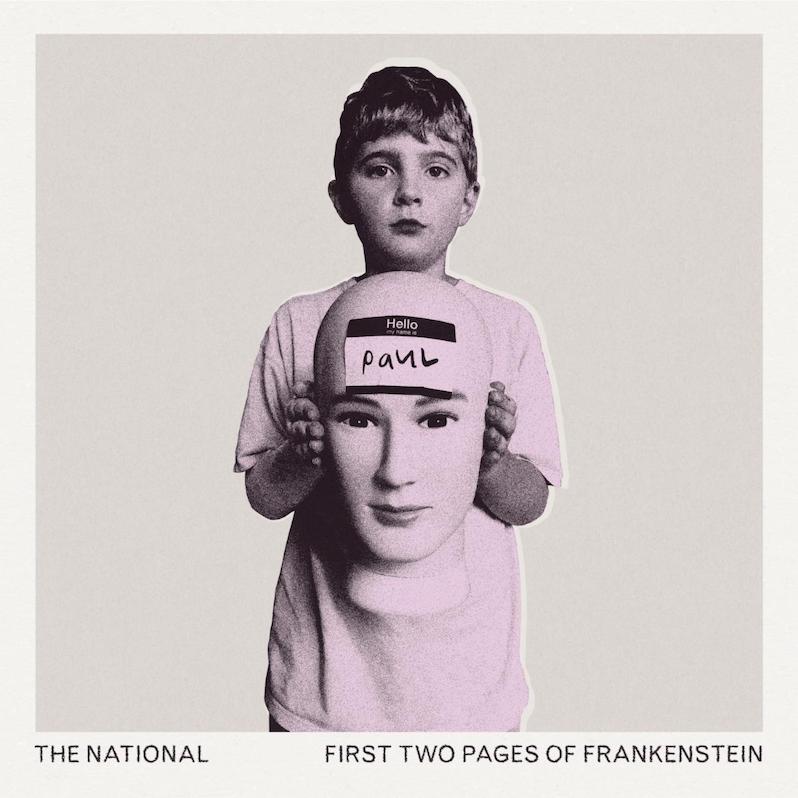The National : First Two Pages of Frankenstein

Can a consistently strong performance be its own kind of obstacle? If anybody knows about that, it’s The National, who, since mastering their signature style of brooding, eloquent drama on 2005’s Alligator, have delivered six straight albums without a clunker in the bunch. The uptown problem with that is that their catalog, to casual fans, might look homogenous. Besides 2007’s Boxer—their big breakthrough which received a presidential stamp of approval—some undeniably standout National albums still feel relatively unsung.
Maybe First Two Pages of Frankenstein will change that. The title is an attention grabber (and no, this is not a concept album about Mary Shelley’s tortured writing process). But what makes the album likely to remain memorable after the post-release ballyhoo wears off is the narrative behind it. The members of the group—Matt Berninger, Bryan and Scott Devendorf, Bryce and Aaron Dessner—have admitted to wondering, during a creative impasse, if they would even complete the record. In the interim since 2019’s I Am Easy to Find, they’ve done side projects, produced records, and became official FOS (Friends of Swift), but they had a hard time finding their way back together. Once they did, they went out and made a wonderful album about people breaking apart.
On recent records, The National have delivered moving ballads like “Quiet Light” and “Guilty Party” that took on relationship angst in a much more direct fashion than what they’d previously done. They lean into that style on First Two Pages of Frankenstein. The entire first half of the record is filled with songs from “I” to “you” detailing different points in time of a deteriorating romance. In the second half, songs like “Ice Machines” and “Your Mind Is Not Your Friend” bring to light the pressures and inner turmoil that make people resistant to the succor of love.
Soundwise, the album doesn’t strain against the band’s formula in the same ways as I Am Easy to Find, with its theatrical leanings and reliance on female guest vocalists. There are subtle progressions here and there, however. Skittering digitalized beats often start off the songs, although they’re usually replaced by the familiar battering of Bryan Devendorf. Matt Berninger’s vocals tend to rise more and more these days out of his traditional deadpan, all the better to display the raw emotions in these heartsick songs.
What hasn’t changed is the band’s ability to rise effortlessly from quiet verses into cacophonous, circular refrains, where, in the context of these songs, the characters seem to be endlessly striving to get back to the halcyon times that have been replaced by their current turmoil. “Eucalyptus” is a twist on Paul McCartney’s “Junk,” with a divorcing couple unable to decide who gets what of all the ephemera—ceiling fans, spring water, Afghan Whigs and Cowboy Junkies CDs—they’ve accumulated in their time together. “New Order T-Shirt” finds the narrator carrying around “split-second glimpses and snapshots and sounds” of his ex to sustain him in his loneliness.
The narrators are often unmoored, unable to reconcile the way their relationships once thrived with how they’ve regressed. Album-opening ballad “Once Upon a Poolside,” featuring Sufjan Stevens on backing vocals, riffs on communication breakdowns as Berninger sings amidst a tender blanket of piano and Bryce Dessner’s orchestration. Phoebe Bridgers adds her haunting harmonies to “This Isn’t Helping,” as the slow-building drama of Bryan Devendorf’s toms accompanies the protagonist in his agony over the kindnesses shown him by his former partner.
After all that sorrow, The National upends expectations of a painful closing song with “Send For Me,” perhaps the most warm-hearted and earnest recording in their catalog. On this track, Berninger encourages a friend that no matter where they might be suffering (in an airport, a gift shop, amidst “swivel-chairing underlings”), he only needs to be beckoned and he’ll be there. The song works as a balm for anyone who’s hurting, but it’s easy to hear it as an intra-band message of rapprochement and reconciliation. Maybe First Two Pages of Frankenstein won’t break out from the pack, and it will be regarded as just another great National album. As if that’s a bad thing.
Label: 4AD
Year: 2023
Similar Albums:




